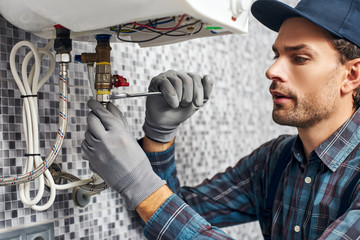Your roof protects your home from the elements and adds to its aesthetic appeal. However, it’s not indestructible, and over time it can sustain damage that requires repair or replacement.
Understanding your options for roofing materials is key to making an informed decision that best meets your climate conditions and maintenance needs. Contact Erie Roofing now!

From thatch, mud and sticks to today’s fancy-cut cedar shingles, roofing has evolved over the years from what was originally designed as a practical shelter against the elements into an important architectural feature of homes. The development of roofing is a testament to the ingenuity of mankind and our constant pursuit of innovation.
Early humans used whatever materials were available to them in the natural environment to construct their roofs, from animal skins and mud to branches and rocks. These primitive roofs provided basic protection from rain, snow and sun, but were prone to leakage and were vulnerable to fire.
The next major step in roofing came with the introduction of thatch, a woven material made from dried vegetation such as grass, straw, reeds or heather. This was a much more sturdy and durable roofing material, but still not water resistant. Somewhat later, clay tiles were introduced as a roofing material and quickly became popular in the regions occupied by civilizations.
Until the development of rolled roofing materials that could be seamed together, residential and commercial buildings were covered in unitized pieces, like split cedar shakes and heavy slate, says Period Homes. The size of these roofs was limited only by the amount of material available and the ability to assemble them on site, with steep slopes to allow for drainage.
When European settlers reached the Americas, they brought with them centuries-old skills in metalworking that allowed them to produce low-slope roofing out of lead sheets and copper pieces soldered together on site. Then, when railroads became a common way to move goods, they began to bring in rolled roofing material manufactured in Europe that could be shipped across the country and soldered together as well. This new roofing material was a better alternative to wooden shakes and slate.
Materials
The outer layer of a roof protects against rain and sun, so the material is important to the structure’s longevity. Roofing materials range from natural products such as thatch and slate to synthetic options. Many of these materials are installed over a secondary water-resistant barrier called underlayment.
Whether you choose a wood, clay tile, metal, asphalt or rubber roof, the lifespan depends upon your climate and maintenance. A wood shingle or shake roof in dry conditions can last 60 years or more, while a clay tile roof in hot climates will require periodic painting and may experience damage from salt air.
Thermoplastic polyolefin (TPO) and polyvinyl chloride (PVC) roofing systems are popular because they resist the elements and are easier to install than other traditional roofing materials. They also resist chemical exposure, bacterial growth and UV radiation. But if you choose this type of roof, make sure you choose a well-known and reputable manufacturer. You’ll also want to ensure the installers are experienced with this type of roof.
Another modern roof option is a rubber membrane, which is durable and resistant to impact, weathering and ultraviolet light. It’s a good choice for flat or low-sloped roofs, and it can be made to resemble other types of roofing materials, making it an attractive option for many homeowners. But be careful of cheaper options, which can be prone to bubbling and cracking.
Rolled roofing, often used in sheds and other utilitarian structures, consists of large rolls of mineral-impregnated or asphalt-impregnated material topped with granules. This is one of the cheapest roofing materials, but it doesn’t have much in the way of aesthetics.
A clay tile roof can add a classic and charming look to your home, as well as stand up to hot and stormy conditions. They are molded into interlocking shapes and fired for strength, and they’re available in a variety of colors and styles.
Stone slabs 1-2 inches thick were once a common roof material in England, the Alps and Scandinavia. They’re heavy, require a strong roof structure and are not recommended for areas with wildfire hazards.
Shapes and Styles
When it comes to roof construction, there are many different shapes and styles to choose from. These designs reflect cultural heritage, environmental adaptation and architectural innovation. Each has its own unique story to tell. The gable roof, for example, is easy to build, sheds water and facilitates ventilation and can be applied to most house designs. Another popular choice is the hip-and-valley roof, which offers multiple dips and peaks that add drama to any home. The skillion roof, on the other hand, provides an attractive feature and is ideal for modern buildings. It is also a great roofing option for rainy or snowy areas, as it has steep slopes that allow water and snow to shed quickly.
There is also the mansard roof, which features a steep lower slope and flat or curved sides, depending on the building’s architecture. It can also be punctuated with dormers to boost lighting and ventilation.
Installation
A home’s roof is a key component of its structural integrity, comfort, and safety. It shields a home’s inhabitants from harsh weather conditions, keeping them dry and comfortable. Yet roofing can be confusing, with different terms and varieties of materials. This blog unlocks the mystery of roofing, explaining what it is, its benefits, and how to choose and install a suitable covering for your home or business.
When hiring a contractor for a roofing project, it’s important to carefully vet the company and ask about their previous work. Also, compare quotes to ensure that all items are included in the final price. Finally, make sure that the contractor is licensed and insured. This will protect you if an accident occurs on your property during the installation process.
Before beginning the actual work, the crew will get their equipment ready and cover any surrounding areas with tarps. This includes covering any landscaping to prevent debris from falling into it and blocking any drains. Then, they’ll begin by waterproofing the valleys – the angled areas of your roof where two slopes meet. Then, they’ll lay shingles from the bottom up, staggered so that each row covers up the gaps left by the previous rows.
















